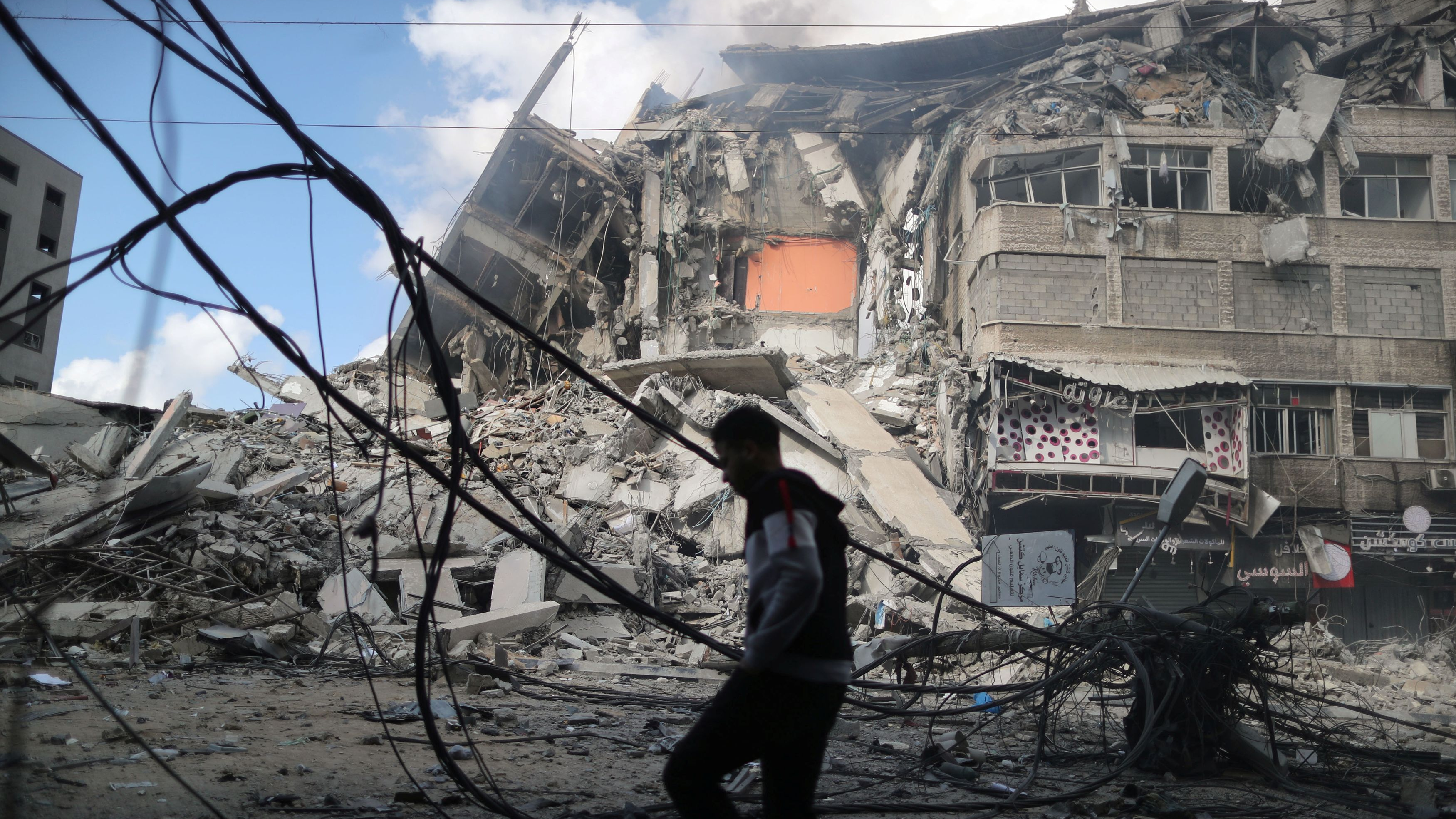
A fireball and smoke billow up into the air during an Israeli airstrike on Gaza City targeting Ansar compound in the Gaza Strip, May 15, 2021. /CFP
A fireball and smoke billow up into the air during an Israeli airstrike on Gaza City targeting Ansar compound in the Gaza Strip, May 15, 2021. /CFP
Editor's note: Dr. Wang Jin is a research fellow of Chahar and associate professor of Northwest University of China. The article reflects the author's opinions, and not necessarily the views of CGTN.
The recent escalation of tensions between Israel and Palestine has led to a humanitarian disaster for both sides. The violent confrontation is the result of distrust and hostility between the two sides, but some factors and incidents make the ties more sensitive.
Several incidents, separately, led to the escalation of tensions. First, the dispute over the status of Sheikh Jarrah gave rise to the fierce dispute over the history of East Jerusalem. Palestinians living in Sheikh Jarrah claim their rights based on documents issued by the Jordanian government from 1948 to 1967 in East Jerusalem, while Jewish settlers claim their rights over land and properties in Sheikh Jarrah based on documents issued by British authorities in Palestine from 1918 to 1947.
The status of Jerusalem is one of the most sensitive issues between Jews and Palestinians. The dispute over Sheikh Jarrah suggests the complicated history of East Jerusalem, especially the conflicted narratives.
For Jews of Israel, the history of Jerusalem could be understood as the history of Jews from suffering to national rebirth. Israeli Jews perceive Jerusalem as the very center, with both national memory and religious importance. Jewish history of Jerusalem could be traced back to Bible times, while Jerusalem was acknowledged as the spiritual center for Jews even after their diaspora period. After modern Zionism emerged in the late 19th century, the ties between the Jewish modern political entity in Palestine and Jerusalem became fixed.
For Palestinians. Jerusalem has both religious and national importance. Jerusalem is treated by Muslims as one of the three Islamic centers, along with Mecca and Medina. The Al-Aqsa mosque in the old city of Jerusalem is the center of religious beliefs for Muslims all around the world. Meanwhile, Jerusalem is symbolic for the Palestinian struggle against Jewish occupation. For Palestinians, Jerusalem is a city that can not be separated or compromised.
Second, the internal competition between Palestinian groups led to the escalation of violence. Although Palestinians are aware of the importance of struggle to realize national establishment, internal division between different groups is still very salient.
Fatah, or the Palestinian National Liberation Movement, the leading group inside the Palestinian authority, is challenged by Hamas, or the Palestinian Islamic Resistance Movement. Many divisions can be found between Fatah and Hamas. For example, Fatah upholds secular political principles, while Hamas upholds Islamic political principles.
Fatah's leadership is largely composed of Palestinian refugees who fled to neighboring Arab states from Palestine after 1948, while Hamas' leadership represents people who lived in East Jerusalem, Gaza and the West Bank under the occupation of Israel after 1948.

A Palestinian man walks past the remains of a building that was destroyed in Israeli airstrikes, amid a flare-up of Israeli-Palestinian violence, Gaza City, May 13, 2021. /Reuters
A Palestinian man walks past the remains of a building that was destroyed in Israeli airstrikes, amid a flare-up of Israeli-Palestinian violence, Gaza City, May 13, 2021. /Reuters
After the initiative of the Oslo peace process in 1990s, the rivalries between Hamas and Fatah became increasingly intensified. In 2006, Hamas won the Palestinian Legislative Council election surprisingly. Hamas' victory was not respected by Fatah, Israel and U.S., and led to intensified internal military confrontation between Hamas and Fatah. After the conflict, Hamas dominated the Gaza Strip, while the Fatah-led Palestinian authority maintained the West Bank.
The outbreak of conflict between Hamas and Fatah makes any concession from Palestine to Israel impossible. Hamas is isolated inside Gaza by both Israel and Egypt's blockade, and it has to provoke and take advantage of every unrest between Jews and Palestinians to grab dominance inside Palestinian society.
Third, Israelis and Palestinians blame each other for the recent escalation. Israel maintains that Hamas has organized and provoked the violence and fired rockets into Israeli territory, threatening Israeli security. Therefore, from Israel's perspective, Hamas should be responsible for the latest violence and Israel has the right to launch attacks against Hamas in Gaza to secure Israelis.
From the perspective of Hamas, Palestinians are resisting Israel's violence and repression. Hamas maintains that it is leading a movement against Israeli oppression and expulsion of Palestinians from their homes. In recent decades, more and more Jewish settlements have been constructed in the West Bank, East Jerusalem and other Palestinian lands.
The living space for Palestinians has been separated, narrowed and squeezed by Israeli walls and fences. The Palestinian unrest, therefore, is not only a struggle against Israel, but an expression of anger and disparate of Palestinians against long-term occupation and marginalization of the Palestinian national dream.
The conflicting narratives between Palestinians and Israelis over their histories and recent tensions suggest the necessity of intervention and mediation by international society. A peace process based on mutual understanding and trust between Israelis and Palestinians is the only way to settle the disputes and divisions.
(If you want to contribute and have specific expertise, please contact us at opinions@cgtn.com.)

